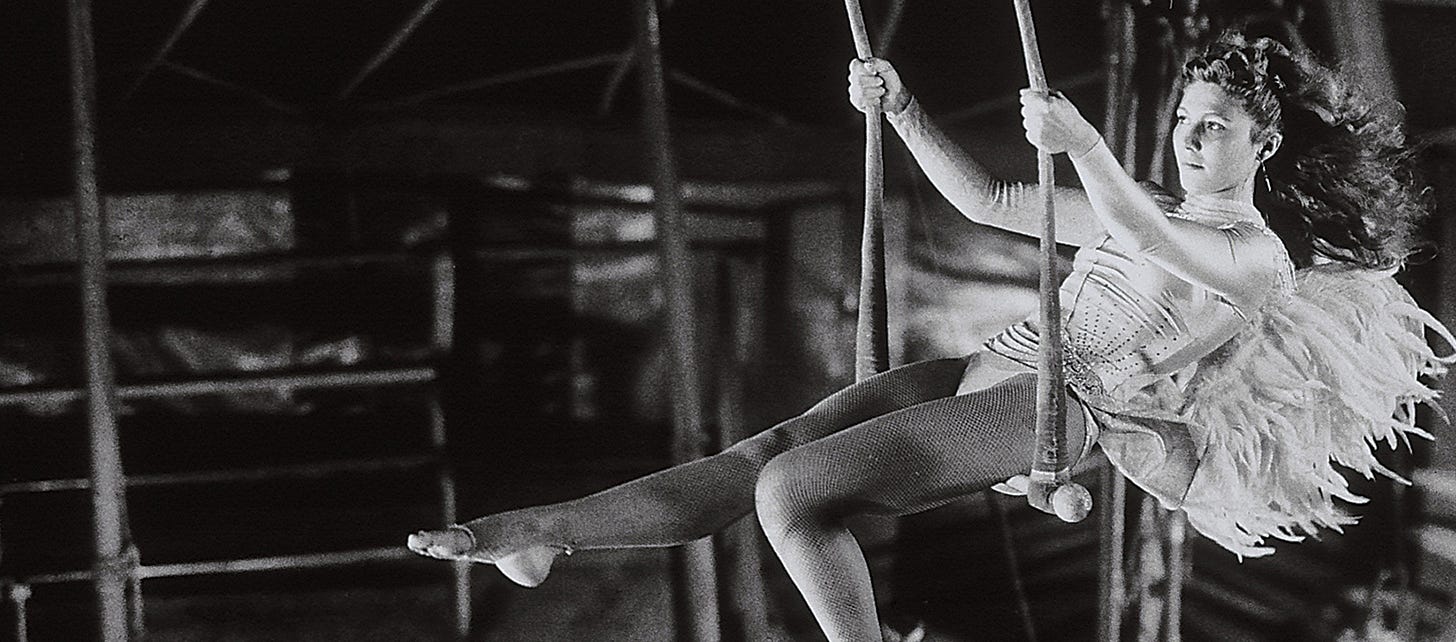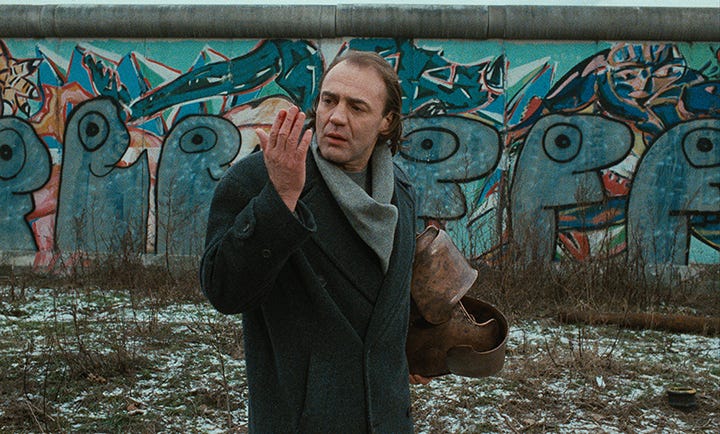The Favourites
Wings of Desire
Wim Wenders is one of the most curious directors of the last forty years. As previously discussed in my essay on Paris, Texas, Wenders searches not for answers or meaning but for purpose. Though others conflate these three things, purpose to Wenders is something much different, much more profound than a simple reason. Purpose is a guiding light, the gut feeling that leads us to love and pain and everything that we hold dear. In Wenders’ second masterpiece Wings of Desire, purpose is explored in West Berlin through the eyes of everyday angels.
These angels, Damiel played beautifully by Bruno Ganz, and his partner Cassiel played by Otto Sander, spend their existence observing, their mantra being “assemble, testify, preserve.” Over the course of one day (and a culmination of millennia), Damiel questions his role and where it lies in the lives of the creatures around him. They listen to the most intimate of thoughts of those around them and discuss instances of humanity they find particularly strange. On discovering a lonesome trapeze artist, Damiel’s questioning of his place in the universe comes further into focus, and his desire to not just understand but to be human overwhelms him. The desire for not just love and understanding, but a desire for a purpose.
The angels do have a purported purpose; Assemble, testify, preserve. These are not given any further explanation but we can determine what they mean through the actions of the angels. Assemble. Damiel and Cassiel, as well as the other nameless angels we see throughout Berlin, have existed here long before people had arrived, before a city was built, and before a great wall divided it. They can not affect the world around them, but they can try and order it, try and determine what is and isn’t. They assemble not the world around them but the cause and effect of that world, and of humanity. Here again, we see they are seeking a purpose, the purpose of action.
Testify. We see throughout the film that the angels are constantly watching, constantly peering into the minds of people around them, though we are never given a specific reason as to why. The angels do not speak of God or of a higher purpose and can be seen less as traditional figures within Christian doctrine and more as interpretations of watchers from any faith. Their testimonies are not to a father figure but to each other, and they are not as to what is right or wrong but what is surprising and unexpected. As Damiel and Cassiel have stated they were here (in what is now Berlin) long before people ever arrived, people are not what they are testifying about, but simply an element of their purpose. As such, the angels still are able to see humanity as mysterious, rebellious, and powerful in its inability to be condensed into a singular thing.
Preserve. The angels are not judgemental figures, are not seeking a list for redemption nor damnation. They are archivists, witnesses to humanity and the world. Again we are not fully told what is the purpose behind this preservation (and they themselves do not know either) but they do believe that chronicling this world is of importance. But we also see that they are never able to understand the world and that there are elements of life that will forever be foreign to an angel. This is seen during their discussions of the unexpected moments humans have, as well as when Damiel gives up his grace and becomes human. Damiel doesn’t know colours, nor smells, nor tastes. Angels are hindered by their grace, and the preservation they are tasked with is incomplete if they lack the curiosity to become human. It’s in questioning their place and their beliefs that their purpose and resolve becomes strong.
The flawed design of the angels is meant to evoke this curiosity in them. They watch but can not feel, not fully. They have sympathy for humans but are desperate to have empathy for them, to understand the small moments, or what the angels are interpreting as small moments. Love for them is considered a small moment, for while the angels feel a sort of protective love for the humans, the deep notion of desire is one that escapes them. This is why Damiel is so drawn to Marion the circus performer. Marion’s astounding loneliness and isolation resonates with Damiel, as he may have lacked the capabilities to fully express his loneliness, he sees himself in the thoughts of Marion.
Marion’s career mirrors that of Damiel and the angels, even being made to dress up as an angel during her act. Floating above the patrons, she has a disconnect with those around her, the clowns and tricksters who fill out the roster of the circus. Not just because of the nature of her act, but she’s unable to fall into the mild joys of drink and joviality as they do, caught up in the sense of doom that overshadows her life. And it’s in the watching of her act that Damiel is able to understand he must deny his grace. In her act, there is the fear that she will fall, but in that fear is the thrill as well. There is fear in being human, but if there wasn’t how would there be any thrill to it? Love would be nothing if not for the fear of losing that love.
While the love story between Damiel and Marion blossoms, we are also treated to the scenes with Cassiel and the dying old man. The old man, aware that he has limited time left, wanders about, considering his life and what It could have been. He considers the war that tore apart his country and countrymen and wonders what his impact on the world was. This old man (Homer) represents the fear of failure that is man, the fear of a wasted life. Cassiel listens to him as he dreams of a life that could have been, of choices not made, and Cassiel’s curiosity about becoming human is sedated, overwhelmed by the fear of failure. The balance between the thrill of love and the fear of failure is one of the most compelling things to find in humanity, in the angels’ eyes and thus the audiences as well.
Along with the stories of our angels and the people they are overseeing, we also follow actor Peter Faulk portraying himself as an actor in Berlin, trying to get into the proper headspace to perform. Faulk can sense the angels, and it is later revealed he himself is a fallen one, an angel who gave up his grace. By choosing a well-known actor to portray themselves, Wenders is again emphasizing the curiosity necessary to have contained grace. Acting is a profession of the curious, a career that is designed to explore as much of the world and of humanity as possible. The first thing we hear Faulk think is that he hasn’t “found” this character yet, which as a former angel is what led him to give up his grace to begin with. He was desperate to understand different aspects of humanity, and now spends his entirety doing just that.
After Damiel does become human, we see that simply experiencing things brings about a childlike wonder in him. He is born to the world for the first time, and experiences colour, smells, tastes, things that were lacking in the life of an angel. This shows that there is only so much joy and humanity that can be found in piousness. The angels are good at what they do, they assemble, testify, and preserve, yet they can not truly understand. Through these three acts, they attempt to find the purpose in humanity and the world. But it’s not until you experience humanity, the sights and sounds of our every day, that the truth is found: there is no purpose. Existence is not a purposeful act, it simply is. Discovering purpose is itself a purposeful act. We search, not because we have to, but because we choose to.
We choose to be curious. We choose to be unpredictable. We choose to look back on life in despair, or to accept our roles and where we are. We choose to love. Free will is what made the angels curious, and is the ultimate act that makes us human.







